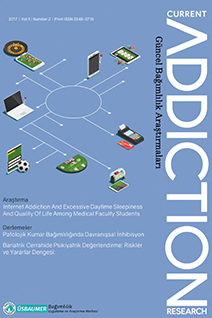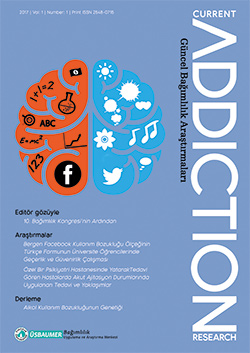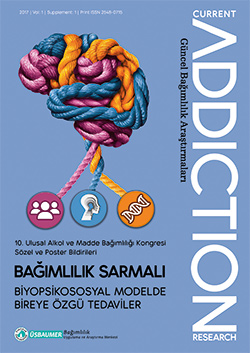ARTICLES
Review Article
Nesrin Dilbaz
2017, 1(2), s:53-55
The prevalence of obesity has been growing on a global scale and almost all health caregivers has been involved in its treatment and management. Bariatric surgery has emerged as an effective approach for weight reduction and associated with improved general health. Preoperative psychiatric assessment for bariatric candidates is necessary since the importance is well established. Also empirical data suggest that a high prevalence of psychiatric comorbidities among bariatric surgery candidates. Research indicates a decrease in certain psychiatric symptoms after weight loss with bariatric surgery. However, the risk of unsuccessful weight loss and suicide in some bariatric surgery patients make monitoring after surgery as important as the careful assessment and management before surgery. Neverthless, this area needs a standard protocol to guide the mental health professionals that deal with bariatric patients. In this review, we focus on the management of bariatric surgery patients both preoperatively psychiatric assessment and postoperatively psychiatric follow up.
Review Article
PATOLOJİK KUMAR BAĞIMLILIĞINDA DAVRANIŞSAL İNHİBİSYON
Gürler Güz,Hatice Özyıldız Güz
2017, 1(2), s:65-71
The gambling disorder was removed from impulse control disorders brought to the head of substance and related disorders with DSM-5. It is one of the reasons for this change to be seen in gambling disorders of malpractice processes in the reward and punishment systems seen in substance use disorders. In the development and maintenance of pathological gambling addiction, it has been shown that inhibition of behavior has an important role rather than impulsivity. Delay in suppression is one of the executive functions and is mainly due to prefrontal dysfunction. For this reason, investigations also examined brain functions in gamblers.
Review Article
Genetics Of Alcohol Use Disorder
Hasan Kaya,Özlem Bolat Kaya,Nesrin Dilbaz
2017, 1(1), s:33-46
Introduction: Alcohol Use Disorder (AUD) is a chronic
psychiatric disorder characterizes by harmful drinking
patterns leading to negative emotional, physical, and
social outcomes. Twin, family, and adoption studies
have consistently demonstrated that genetic factors
play a critical role in the pathogenesis of AUD. Various
studies have aimed to identify genes that contribute
to susceptibility to AUD. In this paper, we provide
an review of genetic studies on AUD, including twin
studies, linkage studies, candidate gene studies, and
genome-wide association studies (GWAS). Growing
evidence indicates that AUD is a complex genetic
disease, with variations in a substantial number of gene
affecting a person’s risk of AUD. Some of these genes
have been identified, including two genes involved in the
metabolism of ethanol (ADH1B and ALDH2) that have
the strongest known affects on the risk of AUD. Studies
continue to find out other genes in which variants affect
the risk of AUD or related traits, including GABRA2,
DRD2, OPRM1, MAOA and PECR. As more variants
are analysed and studies are integrated for meta-analysis
to obtain increased sample sizes, an enhanced picture of
the many genes and pathways that affect the risk of AUD
will be possible.



 2. Sayı
2. Sayı
 1. Sayı
1. Sayı
 Ek Sayı
Ek Sayı







